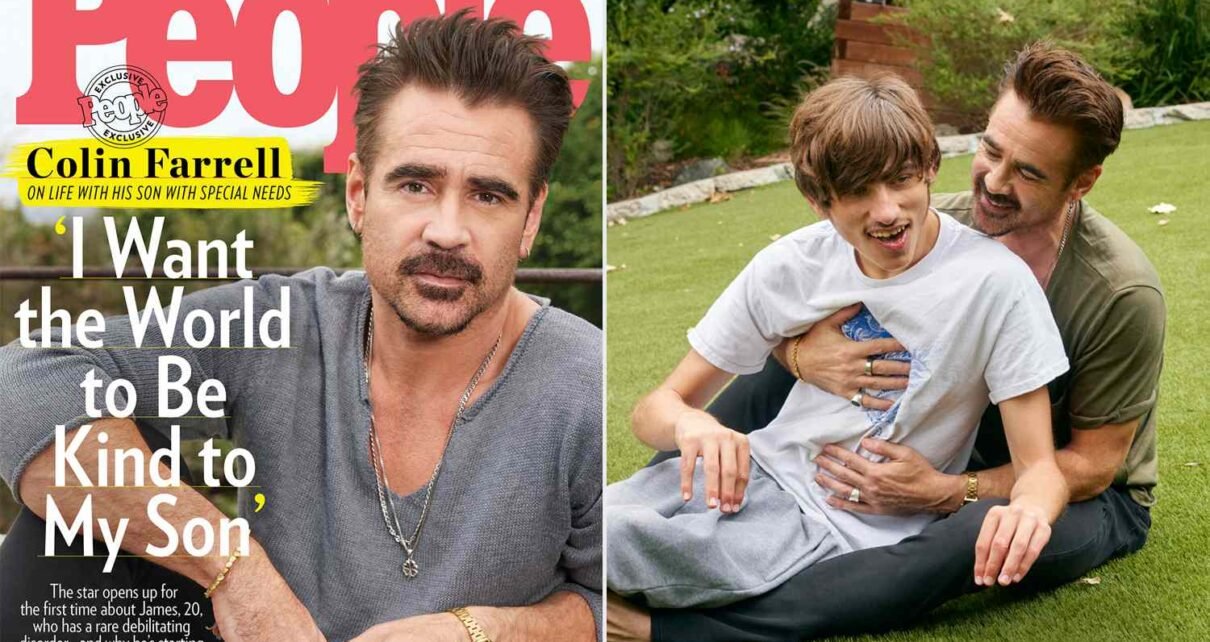Colin Farrell‘s house is filled with a bustle and din that’s far from the actor’s comfort zone.
As photography and video teams scurry about the hillside home in Los Angeles, Farrell, 48, is keeping tabs on his son James, 20, who has Angelman syndrome, a rare neurogenetic disorder. James, who is nonverbal, is sitting in the backyard playing catch with his live-in caregiver. He makes eye contact with a journalist standing nearby and immediately throws the miniature basketball in her direction to include her in his game.
James’ eyes light up when he spots Farrell, but it’s nothing in comparison with the noticeable swell in his dad’s chest when those around them respond so sweetly to his son. “I want the world to be kind to James,” the actor tells PEOPLE. “I want the world to treat him with kindness and respect.”
And that, ultimately, is the driving force behind Farrell’s decision to open up his home and talk in-depth about his life with his son for the first time. Turning 21 in September, James (whom Farrell shares with an ex, model Kim Bordenave) will age out of many of the support systems provided for families with kids who have special needs.
“Once your child turns 21, they’re kind of on their own,” Farrell says. “All the safeguards that are put in place, special ed classes, that all goes away, so you’re left with a young adult who should be an integrated part of our modern society and more often than not is left behind.”
For more of Farrell’s exclusive interview, pick up this week’s issue of PEOPLE on newsstands Friday.
Courtesy Colin Farrell
To help bridge that gap, the actor is now launching the Colin Farrell Foundation to provide support for adult children who have intellectual disabilities through advocacy, education and innovative programs. “This is the first time I’ve spoken about it, and obviously the only reason I’m speaking is I can’t ask James if he wants to do this,” he says.
“I mean, I can. I speak to James as if he’s 20 and has perfect fluency with the English language and age-appropriate cognitive ability. But I can’t discern a particular answer from him as to whether he’s comfortable with all this or not, so I have to make a call based on knowing James’s spirit and what kind of young man he is and the goodness that he has in his heart.”
James “has worked so hard all his life, so hard,” Farrell adds. “Repetition, repetition, balance, his jerky gait. When he started feeding himself for the first time, his face looks like a Jackson Pollock by the end of it. But he gets it in, he feeds himself beautifully. I’m proud of him every day, because I just think he’s magic.”
As for the foundation, Farrell has “for years wanted to do something in the realm of providing greater opportunities for families who have a child with special needs, to receive the support that they deserve, basically the assistance in all areas of life,” he says.
James, and those like him, have “earned the right to have a greater degree of individuality and autonomy on life, and a greater degree of community.”
For now, the actor chooses to believe “that if James knew getting his photograph in the back garden with me, which is not my favorite thing to do, if us doing this could help families and other young adults who live with special needs, he would say, ‘Dad, what are you talking about? Why are you even asking me? It’s a no-brainer,’ ” Farrell adds. “So that’s why we’re doing it. This is all because of James— it’s all in his honor.”
For more information or learn how you can offer support, visit www.colinfarrellfoundation.org.




